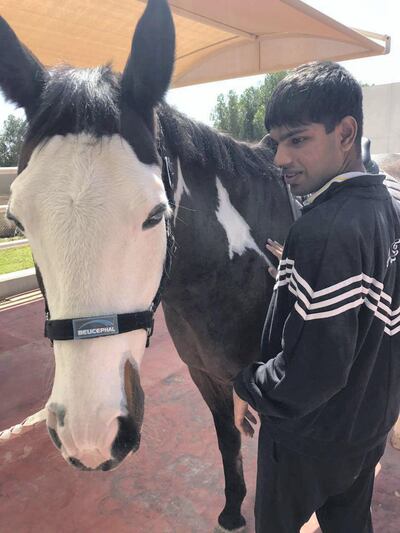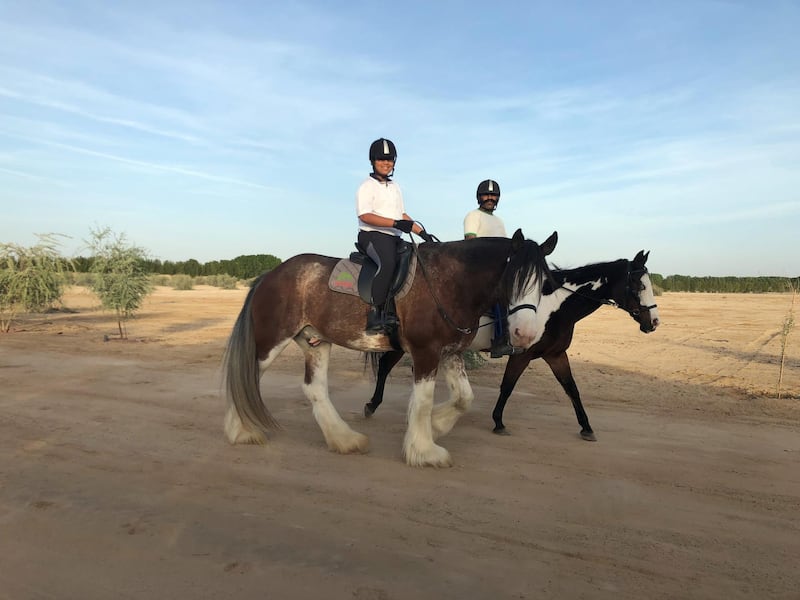Katherine Winny resigned from her high-profile law job after two cases of deep vein thrombosis landed her in hospital. Despite leading a less stressful life and qualifying as a life coach soon after, Winny found that her personal life kept following the same behavioural loop, and she decided to turn to a rather unusual source for relationship help: a horse.
“I booked a joint session with a friend to really explore that space,” says Winny. She went to the Emirates Equestrian Centre stables for a one-off session, met the horses, and identified one she thought she clicked the most with. A long-time horse rider, Winny began petting the animal’s head and then walked across the ring, expecting the horse to follow.
“I was surprised he didn’t. The coach explained that everything was lovely, then I spun around and walked away, and I hadn’t communicated it with the horse. I realised I was doing that in my relationships: walking away, and expecting the other person to follow me and be a mind reader.” It was, Winny explains, a breakthrough. The horse had revealed a pattern she had been unable to spot.
Winny is now a qualified Equus coach. This growing field has already taken off in the US and UK, and is starting to expand to the Middle East.
How it works
Proponents say horses are less intimidating than humans, and are able to mirror and reveal emotions yet act without judgment. “If you’re high-energy, the horse will be high-energy. If you’re timid, the horse will be timid,” says Winny.
There is an element of science behind this; horses are able to hear the human heartbeat within four feet, and research has revealed a horse can synchronise its heart’s rhythm to that of a human’s.
When someone is introduced to the “herd”, horses tend to feed off the physical and emotional responses that govern the person’s behaviour and respond accordingly, giving clues that trained therapists are able to pick up on to know more about their client’s mindset and behavioural patterns.
As a client is interacting with a horse, Winny asks a series of questions and observes. “The idea is that the way we do anything is the way we do everything. So the way you approach something with the horse for the first time, is how you’d approach other things for the first time in other areas,” she says.

Horses can also reveal the stories people tell themselves, such as “this horse is bullying the other horses” or “the horse doesn’t like me because I’m this way or that way”, notes Winny. “I’m there to pick up on things, like, you are telling me this but the horse is reflecting something different, so which feels right in this situation? The horses give honest feedback. They don’t tell us what we want to hear; they reflect what they’re seeing.”
The benefits of pet therapy
Winny shares the story of a couple who came to her for help. They were planning on a move after leaving their previous jobs. “But they were concerned their paths weren’t really aligned,” she says. The woman had all this drive and energy for what was coming next. The man, who was going through a tough exit from his former company, did not.
“When they came, they both tried to do the same activity with the same horse. She got the horse cantering in perfect circles effortlessly. He came into the ring and couldn’t get the horse to move. He was trying and trying … and she realised he was completely exhausted, just drained from his job situation,” says Winny.
When the woman saw that, she understood their relationship tension wasn’t personal. “The next day, he had negotiated the settlement and they were leaving to start their adventure.”
Madeeha Afridi, counselling psychologist at The Lighthouse Arabia Centre for Wellbeing in Dubai, notes there can be benefits to using pets in therapy, and it’s something she has recommended to clients.
“For clients presenting PTSD [post-traumatic stress disorder], anxiety or depression, or mental or physical disabilities, they might feel sensitive or triggered around other individuals,” says Afridi. “With horses and other animals, the client will feel calmer, more open and more comfortable to let their guard down.”
However, she stresses the importance of ensuring the client is well-informed, and says equine therapy isn’t for everyone. “Not all clients are open to pets in therapy, and not all psychologists are trained to use horses or pets. The psychologist [must have] specialised training.” It’s also crucial to make sure the client and horse share chemistry. “Otherwise, it might have a negative impact on the healing process.”
Helping people of determination
This form of therapy is also increasingly being used to help people of determination. While it’s a developing field, proponents note that for individuals with mental disabilities, equine therapy can help them work through various emotional difficulties. It can assist with concentration, the ability to follow instructions, and simply becoming comfortable around others.
For those with physical disabilities, the therapy can bring health benefits. Studies presented at the International Congress of Equine Facilitated Programmes indicated that equine therapy can even help with multiple sclerosis; when practised alongside standard care, it reduces fatigue and improves balance and the overall quality of life.
Vikram Kumar, a UAE resident with autism, first started equine therapy in 2016. He was a student at Al Marmoom Initiative, a non-profit organisation that offers horse therapy classes free of charge for individuals with special needs. “It took a good year before he would get on the horse, because from the start he was so afraid and very shy,” says Yana Shuhaylo, stable manager at Al Marmoom, which is located on Al Qudra road in Dubai.

The process was a gentle one. First the team moved Kumar to a stable. Then they helped him pet a horse. “Slowly, he became more comfortable and started to open up to people,” says Shuhaylo. Eventually, Kumar began grabbing a helmet and waiting quietly while the other students were riding.
“We saw he was ready,” Shuhaylo says. So they helped Kumar on to a horse. “And he had this smile, this big, huge smile … now he has been riding for over a year. He’s listening better, responding more and is much more comfortable with people. He’s really amazing.”
In addition to working with private clients, Winny assists at Al Marmoom. “The students put their attention on one thing and it builds their confidence, helps with their neuro-skills and even their speaking,” she says. “The horse isn’t there telling them what to do or not to do. It’s just there. They can explore that and really connect.”







